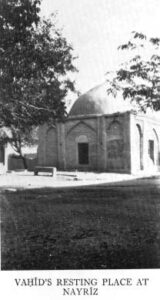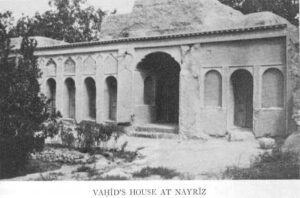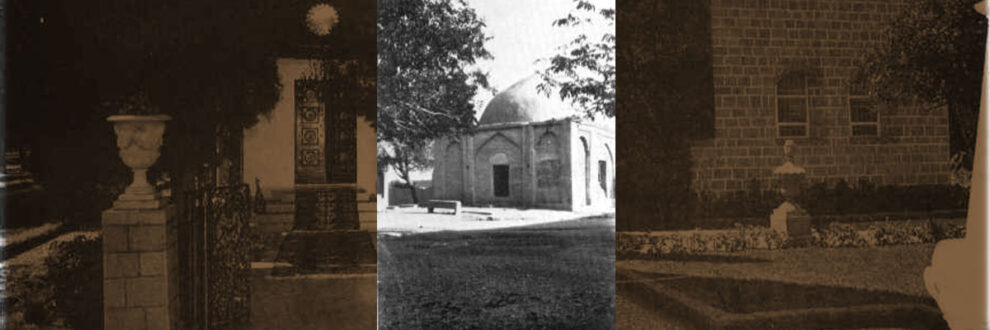 Siyyid Yahya-i-Darabi (Vahid)
Siyyid Yahya-i-Darabi (Vahid)
Born: 1811
Death: June 29, 1850
Place of Birth: Unknown
Location of Death: Nayriz, Iran
Burial Location: No cemetery details
Siyyid Yahya Darabi was named Vahid Akbar which means the great peerless one by the Báb.
Muhammad Shah himself was moved to ascertain the veracity of these reports and to enquire into their nature. He delegated Siyyid Yahyay-i-Darabi the most learned, the most eloquent, and the most influential of his subjects, to interview the Báb and to report to him the results of his investigations. The Shah had implicit confidence in his impartiality, in his competence and profound spiritual insight. He occupied a position of such pre-eminence among the leading figures in Persia that at whatever meeting he happened to be present, no matter how great the number of the ecclesiastical leaders who attended it, he was invariably its chief speaker. None would dare to assert his views in his presence. They all reverently observed silence before him; all testified to his sagacity, his unsurpassed knowledge and mature wisdom.
‘Abdu’l-Bahá said,
“This remarkable man, this precious soul, had committed to memory no less than thirty thousand (30,000) traditions, and was highly esteemed and admired by all classes of people. He had achieved universal renown in Persia, and his authority and erudition were widely and fully recognized.”
In those days Siyyid Yahya was residing in Tihran in the house of Mirza Lutf-‘Ali, the Master of Ceremonies to the Shah, as the honoured guest of his Imperial Majesty. The Shah confidentially signified through Mirza Lutf-‘Ali his desire and pleasure that Siyyid Yahya should proceed to Shiraz and investigate the matter in person.
“Tell him from us, commanded the sovereign, “that inasmuch as we repose the utmost confidence in his integrity, and admire his moral and intellectual standards, and regard him as the most suitable among the divines of our realm, we expect him to proceed to Shiraz, to enquire thoroughly into the episode of the Siyyid-i-Bab, and to inform us of the results of his investigations; We shall then know what measures it behoves us to take.”
Siyyid Yahya had been himself desirous of obtaining first-hand knowledge of the claims of the Báb, but had been unable, owing to adverse circumstances, to undertake the journey to Fars. The message of Muhammad Shah decided him to carry out his long-cherished intention. Assuring his sovereign of his readiness to comply with his wish, he immediately set out for Shiraz.
On his way, he conceived the various questions which he thought he would submit to the Báb. Upon the replies which the latter gave to these questions would, in his view, depend the truth and validity of His mission. Upon his arrival at Shiraz, he met Mulla Shaykh Ali, surnamed Azim, with whom he had been intimately associated while in Khurasan. He asked him whether he was satisfied with his interview with the Báb. “You should meet Him,” Azim replied, “and seek independently to acquaint yourself with His Mission. As a friend, I would advise you to exercise the utmost consideration in your conversations with Him, lest you, too, in the end should be obliged to deplore any act of discourtesy towards Him.”
Siyyid Yahya met the Báb at the home of Haji Mirza Siyyid Ali, and exercised in his attitude towards Him the courtesy which Azim had counselled him to observe. For about two hours he directed the attention of the Báb to the most abstruse and bewildering themes in the metaphysical teachings of Islam, to the obscurest passages of the Qur’an, and to the mysterious traditions and prophecies of the imams of the Faith. The Báb at first listened to his learned references to the law and prophecies of Islam, noted all his questions, and began to give to each a brief but persuasive reply. The conciseness and lucidity of His answers excited the wonder and admiration of Siyyid Yahya. He was overpowered by a sense of humiliation at his own presumptuousness and pride. His sense of superiority completely vanished. As he arose to depart, he addressed the Báb in these words:
“Please God, I shall, in the course of my next audience with You, submit the rest of my questions and with them shall conclude my enquiry.”
As soon as he retired, he joined Azim, to whom he related the account of his interview. “I have in His presence,” he told him,
“expatiated unduly upon my own learning. He was able in a few words to answer my questions and to resolve my perplexities. I felt so abased before Him that I hurriedly begged leave to retire.”
Azim reminded him of his counsel, and begged him not to forget this time the advice he had given him.
In the course of his second interview, Siyyid Yahya, to his amazement, discovered that all the questions which he had intended to submit to the Báb had vanished from his memory. He contented himself with matters that seemed irrelevant to the object of his enquiry. He soon found, to his still greater surprise, that the Báb was answering, with the same lucidity and conciseness that had characterised His previous replies, those same questions which he had momentarily forgotten. “I seemed to have fallen fast asleep,” he later observed. “His words, His answers to questions which I had forgotten to ask, reawakened me. A voice still kept whispering in my ear: `Might not this, after all, have been an accidental coincidence?’ I was too agitated to collect my thoughts. I again begged leave to retire. Azim, whom I subsequently met, received me with cold indifference, and sternly remarked:
“Would that schools had been utterly abolished, and that neither of us had entered one! Through our little-mindedness and conceit, we are withholding from ourselves the redeeming grace of God, and are causing pain to Him who is the Fountain thereof. Will you not this time beseech God to grant that you may be enabled to attain His presence with becoming humility and detachment, that perchance He may graciously relieve you from the oppression of uncertainty and doubt?”
I resolved that in my third interview with the Báb I would in my inmost heart request Him to reveal for me a commentary on the Surih of Kawthar.
I determined not to breathe that request in His presence. Should he, unasked by me, reveal this commentary in a manner that would immediately distinguish it in my eyes from the prevailing standards current among the commentators on the Qur’an, I then would be convinced of the Divine character of His Mission, and would readily embrace His Cause. If not, I would refuse to acknowledge Him. As soon as I was ushered into His presence, a sense of fear, for which I could not account, suddenly seized me. My limbs quivered as I beheld His face. I, who on repeated occasions had been introduced into the presence of the Shah and had never discovered the slightest trace of timidity in myself, was now so awed and shaken that I could not remain standing on my feet. The Báb beholding my plight, arose from His seat, advanced towards me, and, taking hold of my hand, seated me beside Him. `Seek from Me,’ He said, `whatever is your heart’s desire. I will readily reveal it to you.’ I was speechless with wonder. Like a babe that can neither understand nor speak, I felt powerless to respond. He smiled as He gazed at me and said: `Were I to reveal for you the commentary on the Surih of Kawthar, would you acknowledge that My words are born of the Spirit of God? Would you recognise that My utterance can in no wise be associated with sorcery or magic?’ Tears flowed from my eyes as I heard Him speak these words.
All I was able to utter was this verse of the Qur’an:
`O our Lord, with ourselves have we dealt unjustly: if Thou forgive us not and have not pity on us, we shall surely be of those who perish.’
“It was still early in the afternoon when the Báb requested Haji Mirza Siyyid Ali to bring His pen-case and some paper. He then started to reveal His commentary on the Surih of Kawthar. How am I to describe this scene of inexpressible majesty? Verses streamed from His pen with a rapidity that was truly astounding. The incredible swiftness of His writing, the soft and gentle murmur of His voice, and the stupendous force of His style, amazed and bewildered me. He continued in this manner until the approach of sunset. He did not pause until the entire commentary of the Surih was completed. He then laid down His pen and asked for tea. Soon after, He began to read it aloud in my presence. My heart leaped madly as I heard Him pour out, in accents of unutterable sweetness, those treasures enshrined in that sublime commentary. I was so entranced by its beauty that three times over I was on the verge of fainting. He sought to revive my failing strength with a few drops of rose-water which He caused to be sprinkled on my face. This restored my vigour and enabled me to follow His reading to the end.
“When He had completed His recital, the Báb arose to depart. He entrusted me, as He left, to the care of His maternal uncle. `He is to be your guest,’ He told him, `until the time when he, in collaboration with Mulla Abdu’l-Karim, shall have finished transcribing this newly revealed commentary, and shall have verified the correctness of the transcribed copy.’ Mulla Abdu’l-Karim and I devoted three days and three nights to this work. We would in turn read aloud to each other a portion of the commentary until the whole of it had been transcribed. We verified all the traditions in the text and found them to be entirely accurate. Such was the state of certitude to which I had attained that if all the powers of the earth were to be leagued against me they would be powerless to shake my confidence in the greatness of His Cause.
“As I had, since my arrival at Shiraz, been living in the home of Husayn Khan, the governor of Fars, I felt that my prolonged absence from his house might excite his suspicion and inflame his anger. I therefore determined to take leave of Haji Mirza Siyyid Ali and Mulla Abdu’l-Karim and to regain the residence of the governor. On my arrival I found that Husayn Khan, who in the meantime had been searching for me, was eager to know whether I had fallen a victim to the Báb’s magic influence. `No one but God,’ I replied, `who alone can change the hearts of men, is able to captivate the heart of Siyyid Yahya. Whoso can ensnare his heart is of God, and His word unquestionably the voice of Truth.’ My answer silenced the governor. In his conversation with others, I subsequently learned, he had expressed the view that I too had fallen a hopeless victim to the charm of that Youth. He had even written to Muhammad Shah and complained that during my stay in Shiraz I had refused all manner of intercourse with the ulamas of the city. `Though nominally my guest,’ he wrote to his sovereign, `he frequently absents himself for a number of consecutive days and nights from my house. That he has become a Babi, that he has been heart and soul enslaved by the will of the Siyyid-i-Bab, I have ceased to entertain any doubt.’
“Muhammad Shah himself, at one of the state functions in his capital, was reported to have addressed these words to Haji Mirza Aqasi: `We have been lately informed that Siyyid Yahyay-i-Darabi has become a Babi. If this be true, it behoves us to cease belittling the cause of that siyyid.’ Husayn Khan, on his part, received the following imperial command:
`It is strictly forbidden to any one of our subjects to utter such words as would tend to detract from the exalted rank of Siyyid Yahyay-i-Darabi. He is of noble lineage, a man of great learning, of perfect and consummate virtue. He will under no circumstances incline his ear to any cause unless he believes it to be conducive to the advancement of the best interests of our realm and to the well-being of the Faith of Islam.'[1]

During the Nayriz massacre, Zaynu’l-‘Abidin Khan had given his oath to Vahid for his safety and needed to figure out a way around this. One of his military commanders stepped forward to volunteer and others followed. Hungry for revenge, they walked up to Vahid and yanked his turban (the sign of his lineage) off his head and wound it around his neck. Blow after blow struck Vahid. They tied his turban to a horse and dragged him through the streets. His body was beheaded, his head skinned, and the scalped skin filled with straw. The feet were fastened to a horse and dragged through streets and alleys for people to desecrate the corpse. [2]
Siyyid Yahyay-i-Darabi, one of the most prominent clerics of his time who had given up all social position and prestige purely on faith. The Báb declared him to be one of the two witnesses of the Cause of God. [2]
The following Tablet of Visitation was written for Vahid-i-Darabi by Bahá’u’lláh in memory of Vahid, blessing him for his certitude and his courage and for having responded to the divine call: [2]
For his holiness Vahid hath this been revealed, he who beheld the Countenance of God, the All-Glorious, the Almighty, and who in His path sacrificed himself, arose to serve His Cause and quaffed his fill of the draught of certitude from the Hand of his Lord, the Munificent.
“He is supreme over His Cause and powerful over His creation.”
The first wave of exaltation from the ocean of grace of thy Lord, the Compassionate, be upon thee [Vahid] who art the essence of the Qur’an and possessor of the mysteries of the Bayan.
I testify that thou drank of the choice wine of His Revelation from the hand of His favor and grace, and attained the presence of Him Who was the Promised One in all the sacred Books, Scriptures and Tablets. Thou didst hearken unto the divine Call when raised and perceived its manifestation above the Exalted horizon on a Day when all the dwellers of the mortal kingdom rejected the Creator of the heavens. Thou hast, moreover, discerned the Most Great Announcement and inhaled the fragrance of the garment of the Lord of Days.
I testify that thou rendered victorious the Faith of God and His Cause through thy pen, thy tongue and thy hand until thou didst surrender thy life in His path and quaffed from the Kawthar (heavenly fountain) of self-renunciation in His name and in His love. Thou wast intoxicated from the spring of His Recognition and hath soared with the wings of certitude in the heaven of the murmur of thy God, the Lord of Grandeur. Over thy sufferings have all the atoms of the earth cried and the eye of creation wept.
I testify that because of thee all the treasures of earth appeared and all the pearls of sea were revealed. Through thee, the pinnacle of understanding was adorned with the crown of revelation. Thou art the one who accepted the choice sealed wine in the presence of all and drank thy fill in the Name of thy Lord, the Ancient of Days.
May the resplendent glory which hath dawned from the horizon of divine grace, and effulgent light from the heaven of sanctified justice, rest upon thee and upon those who have assisted thee. For they accepted the One that thou had accepted and repudiated those who had risen against thee. With thee and under thy shadow, they rendered the Cause victorious, having beheld thee and circled around thee.
O God, my God, creator of me and of the heavens, I beseech Thee by the pearls of the ocean of Thy Oneness, by the mysteries of Thy Book, and by lamentation of Thy loved ones in their separation from Thee, and by the tears of the pure ones on their remoteness from Thee, I invoke thee, O Thou Lord of indomitable Strength, by this sacred Tomb and by this exalted Shrine [Vahid’s], to forgive me and my father, and all those who for Thy sake have approach these sacred remains, and all those who have come and will come on pilgrimage to this spot.
O my God, I beseech Thee by him [Vahid] and those who have suffered martyrdom in Thy path to grant me and to those who remain faithful in Thy Covenant, the necessities of life. Thou art the All-knowing, the All-wise, Sovereign of creation. [3]
Source:
1 Nabil. The Dawn Breakers. Wilmette, Illinois: Bahá’í Publishing Trust. pp.171-177
2 Ahdieh, Hussain and Chapman, Hillary. Awakening. Wilmette, Illinois: Bahá’í Publishing pp. 99-101
3 Rabbani, Ahang. “Tablet of Visitation for Vahid-i-Darabi” Bahai-Library.org: Winters, Jonah
Images:
The Dawn Breakers, Chapter XXII: bahai-library.com
The Dawn Breakers, Chapter XXII: bahaiawareness.com




